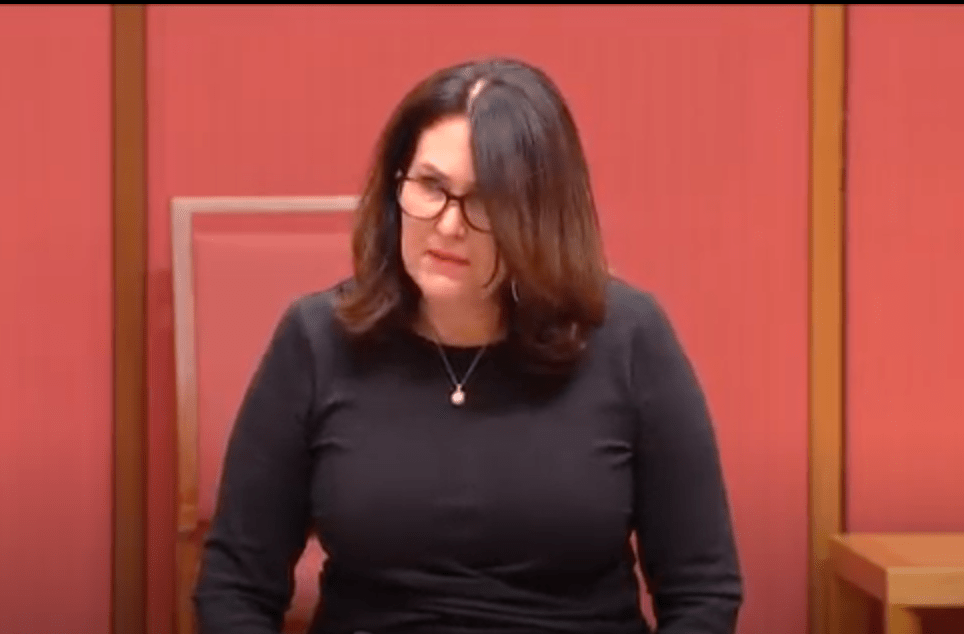Senator Deborah O’Neill has used parliamentary privilege to detail the horrific experiences of sexual harassment a young woman says she experienced at the hands of more senior men in the business at AMP.
Senator O’Neill made the speech after the was approached by the whistleblower and given permission to share her story. The whistleblower remains anonymous, but O’Neill said she’s a “young woman who deserves a medal for bravery and resilience.”
“AMP tried to silence her,” O’Neill said prior to reading the statement. “Tonight I use my platform as a female Labor Senator to give her words a public voice.”
She also used the speech to urge corporate Australia to do better on responding to sexual harassment allegations. And she described the story she read as being like so many others that have been shared with her by men and women in the financial services sector.
“It has to stop,” she said. “This cannot continue. Australia is better than this. Come on corporate Australia, surely you can destroy the cultural stain on our nation.”
O’Neill read the former AMP employee’s statement detailing how over the past eight weeks she has relived her experiences of sexual harassment “with utter dismay that I see the AMP system remains as it ever was.”
Back in early July media reports emerged regarding the appointment of Boe Pahari as CEO of AMP Capital CEO. The board promoted Pahari despite knowing he had been financially penalized for sexual harassment, with Julia Szlakowski publicly revealing details of her complaint against her former boss Pahari last week.
This week, following pressure for shareholders, Pahari has been demoted from the role (but still remains with AMP) and AMP Chair David Murray, who signed off on the “unanimous board decision” to promote Pahari, has stood down.
The survivor says that she endured consistent and systematic harassment as a junior female employee at AMP. She says that after speaking out she was bullied, victimised and ultimately silenced. She raised formal complaints with the company — including via legal representatives — “but none were resolved safely, let alone satisfactorily.”
The details are truly shocking, traumatic, upsetting and as the survivor puts it: life and career-destroying. They are well beyond the realm of “low level” if such a thing can really exist when it comes to sexual harassment at work.
The harassment included being sent sexually explicit photos and emails, constant and public propositioning, physical harassment and the final, absolutely horrific and shocking one — a direct manager threatening to end her career if she did not follow through with his sexual wishes while on a work trip. She says she feared for her physical safety and that her only saving grace was that he was blind drunk. As he poured himself another drink, she ran.
AMP put the woman through months of dragged-out proceedings. She was given five days to sign an NDA — she was almost certain that what was being asked of her was illegal, but she had run out of money to pay her lawyers. She says she signed the NDA because by then she felt physically and psychologically destroyed.
She describes just how vulnerable she felt during this period, how utterly powerless and worthless she felt and the extreme pressure she was placed under to make an immediate decision. Desperate. Cornered. Left to the mercy of those higher up. She became a shadow of the previously outgoing and well-spoken woman she once was.
“I knew I was just one small person who would be crushed by the force of one of Australia’s largest companies.”
But she thought the harassment was so blatant and unequivocal that AMP would do the right thing. That by signing the document, she would salvage her career and keep her livelihood.
She was wrong. She was demoted and wound up photocopying documents. She was told she’d have to continue to attend meetings with her harasser.
This survivor’s account also highlights the trauma and challenges survivors face in getting their complaints taken seriously — as the survivor’s lawyers told her, organisations will often take their chances, knowing that women will be unwilling to risk ruining their lives and careers and the hundreds of thousands of dollars in legal fees it’d take to get a case heard in court.
Two of the cases were escalated internally — but in one case the perpetrator went on to be repeatedly promoted. In the other case, the perpetrator was simply given a warning and allowed to continue in his role. He went on to harass another colleague, who then left the industry.
The survivor says her time with the employer destroyed her life, and that it’s taken everything she has to rebuild parts of it — yet she knows that it will never be the same again.
The perpetrators of the harassment instead have gone on to “thrive”.
If you or someone you know is in immediate danger, call 000.
If you need help and advice, call 1800Respect on 1800 737 732, Men’s Referral Service on 1300 766 491 or Lifeline on 13 11 14.


